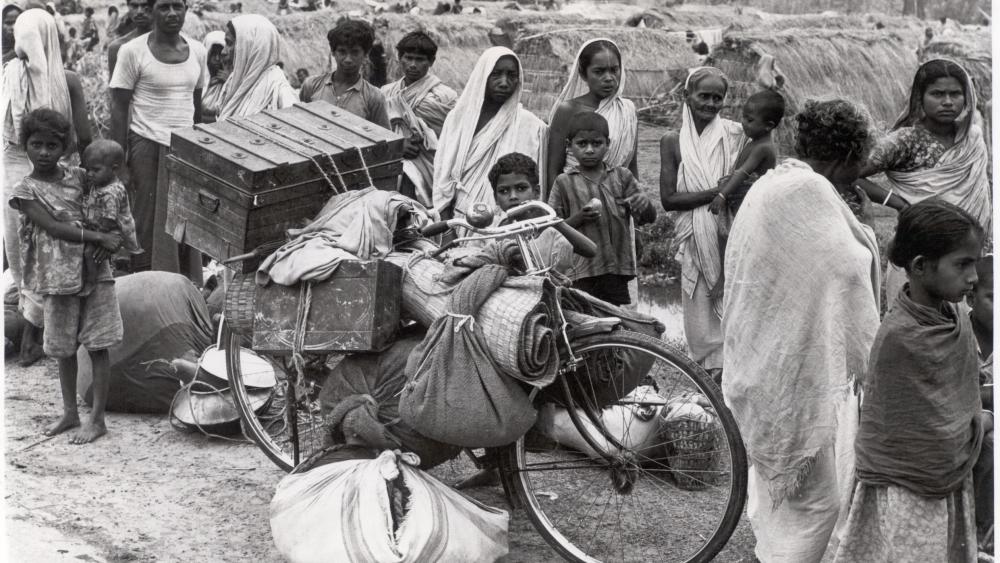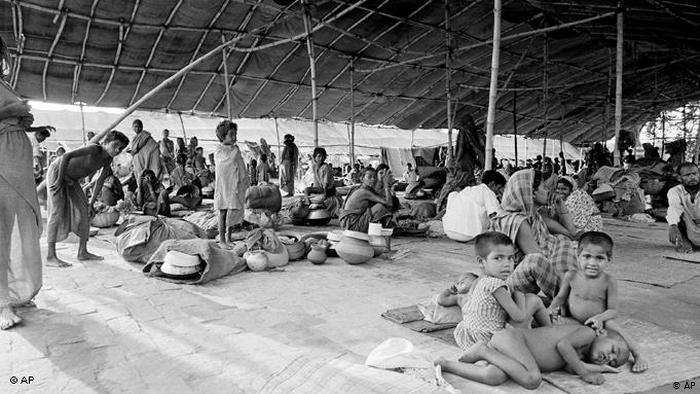Two children together in palm roof shade
Stare at me no word is said
Rice ration, lentils one time a week
Milk powder for war-weary infants meek
“September on Jessore Road”
Allen Ginsberg November 14-16, 1971
On that day, East Bengal walked to Calcutta. Millions of refugees took shelter on the border of West Bengal and India. The refugee camps along the border became pieces of Bangladesh. When the refugee camp becomes a house, what is life like there? What does a war-torn home-household-nation look like? Where is the sanctuary of the refugees hungry for rice or mourning their torn-apart family? As citizens of Bangladesh, we also have the responsibility to teach ourselves that history.
Thirteen Hundred Miles Beyond the Border

1971 is in full swing. Millions of refugees are fleeing to the border from remote villages and cities. They have lost their relatives, their respect, their husbands, children, and homes, and they are now in search of survival. Refugee camps across the border are their destinations in the hopes of only a handful of food, a little security, and a little shelter. Even though it is 1300 miles or more away. They walk on muddy dirt paths, crossing dense jungles. Many of the old and sickly never make it. Many are caught by the Pakistanis just on the brink of refuge of the border.
On April 30, 1971, a headline in the Amritbazar newspaper read, “900 refugees killed on their way to India.” So simply, within an hour, the number of people in the refugee line decreased, with the number of dead increasing. Yet for those who survived, their destination remained the same; the refugee camps. On the way there, people sold their valuables, their heirlooms of loved ones, or the last of their possessions, all just to get the bare minimum of food to stay alive. The only thing that mattered was the survival of the fittest. Some survived the gunfire, some were raped, some kept walking with bullet wounds in their bodies. The only companions these people had were each other and the horrible memories of the war.
In October 1971, Oxfam published a pamphlet titled “The Testimony of the Sixty”. In his account of the eyewitnesses, Ralph Range wrote, ‘There is an endless stream of people. These are all refugees. We counted 500 bullock carts. People walking on either side of the car. They are trying to walk fast. They have their hands up and started screaming. It seemed that they were eager to tell us about their plight. Some people came running towards us and started pointing fingers at where they came from. Although none of us are Bengali speakers, we did not have a problem understanding them. The village they were forced to leave is burning. An old man with white hair raised his hand to the sky and cried. He told us in gestures that all his eight children had been killed.”
Hundreds of People Floating Homeless

Gathering his own experience, Sukhendu Sen wrote in “Refugee 71”: “Like a row of ants climbing trees, crossing inaccessible paths, rivers, canals, forests, jungles, sun, and rain, with a constant fear of the future, refugees are entering India through Assam, Tripura, West Bengal, and Meghalaya. Schools, colleges, railway stations, abandoned courtyards, government establishments, empty warehouses are being used as shelters on top of which rows and rows of huts with bamboo and plastic wraps are made to house more refugees.’
Every day about 30,000 refugees crossed the border through Jessore Road alone. The number of refugees who took refuge in India in December 1971 stood at around one crore. Refugee camps were then set up in West Bengal, Assam, Tripura, and Meghalaya, in every area bordering India. Small cottage tents, small tents, cement sheets, and large drain pipes; these were the refugee houses in the camps. But the influx of so many refugees could not be accommodated there either. Then, the open sky, until the end of the war, became their shelter or home.
In The Testimony of Sixty, Julian Francis wrote, “the thatched tent is helpless to the rain, the earthen bed stays wet and monotonous. Hundreds of refugees from the cottages are lining up for government rations, and their queues for water and sanitation are eye-catching. People with diarrhea are rarely able to control themselves. The children have also lined up for their special nutritious food”. “This is a biography of 9 million refugees,” Julian wrote. Those who did not have a job did not have money. But they knew why they had come. They also knew that this place was safe for them. There is no alternative but to come here to save themselves.
Nature had not been kind to these refugees huddled under the open sky. Many refugee camps were in low-lying areas. During the rainy season, water accumulated, forcing people to stand in the water all night. Then there was pneumonia. But there were not enough doctors or prescriptions for so many sickly and starving people. Numerous refugees died without treatment.
There was also a shortage of drinking water in the camps. Countless people had suffered from dehydration. The shortage of food was so great that you could count the ribs of children. Millions of children died of malnutrition. For all the children that were born in this miserable time, their reality became even crueler! Some were born under trees, some in boats, some in refugee camps. Due to malnutrition, there was no milk for mothers to give. How many mothers had run away leaving their children in hunger!
These houses, called refugee camps, lacked everything, but there was no shortage of tears. Some cried because of hunger, some for children, some for the shame of honor, some at the loss of their whole families. Among the thousands of uncertainties, the easiest option was to die in the camps. But even dying, the people dreamed of returning home when the country became independent! They dreamed of growing golden paddy in the abandoned crop fields.
Is it possible to pay the price of that dream or misery of those hungry, naked, sick people sitting in this independent country today?




